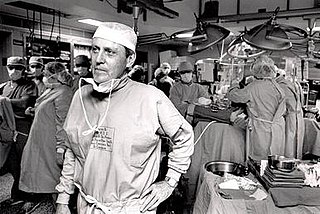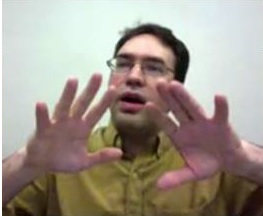
In academic publishing, a scientific journal is a periodical publication intended to further the progress of science, usually by sharing findings from research with readers. They are normally specialized based on discipline, with authors picking which one they send their manuscripts to.
Reproducibility, closely related to replicability and repeatability, is a major principle underpinning the scientific method. For the findings of a study to be reproducible means that results obtained by an experiment or an observational study or in a statistical analysis of a data set should be achieved again with a high degree of reliability when the study is replicated. There are different kinds of replication but typically replication studies involve different researchers using the same methodology. Only after one or several such successful replications should a result be recognized as scientific knowledge.
The Multidisciplinary Association for Psychedelic Studies (MAPS) is an American nonprofit organization working to raise awareness and understanding of psychedelic substances. MAPS was founded in 1986 by Rick Doblin and is now based in San Jose, California.

Robert Samuel Langer Jr. FREng is an American biotechnologist, businessman, chemical engineer, chemist, and inventor. He is one of the twelve Institute Professors at the Massachusetts Institute of Technology.

Daphne Koller is an Israeli-American computer scientist. She was a professor in the department of computer science at Stanford University and a MacArthur Foundation fellowship recipient. She is one of the founders of Coursera, an online education platform. Her general research area is artificial intelligence and its applications in the biomedical sciences. Koller was featured in a 2004 article by MIT Technology Review titled "10 Emerging Technologies That Will Change Your World" concerning the topic of Bayesian machine learning.

Thomas Earl Starzl was an American physician, researcher, and expert on organ transplants. He performed the first human liver transplants, and has often been referred to as "the father of modern transplantation." A documentary, entitled "Burden of Genius," covering the medical and scientific advances spearheaded by Starzl himself, was released to the public in 2017 in a series of screenings. Dr. Starzl also penned his autobiography, "The Puzzle People: Memoirs Of A Transplant Surgeon," which was published in 1992.

Christoph Meinel is a German computer scientist and professor of Internet technologies and systems at the Hasso Plattner Institute (HPI) of the University of Potsdam. In the years 2004 to 2023 he was the scientific director and CEO of the HPI and has developed the openHPI learning platform with more than 1 million enrolled learners. In 2019, he was appointed to the New Internet IPv6 Hall of Fame.
Angela K. Wilson is an American scientist and former (2022) President of the American Chemical Society. She currently serves as the John A. Hannah Distinguished Professor of Chemistry, associate dean for strategic initiatives in the College of Natural Sciences, and director of the MSU Center for Quantum Computing, Science, and Engineering (MSU-Q) at Michigan State University.

Andrew Yan-Tak Ng is a British-American computer scientist and technology entrepreneur focusing on machine learning and artificial intelligence (AI). Ng was a cofounder and head of Google Brain and was the former Chief Scientist at Baidu, building the company's Artificial Intelligence Group into a team of several thousand people.

Data science is an interdisciplinary academic field that uses statistics, scientific computing, scientific methods, processes, algorithms and systems to extract or extrapolate knowledge and insights from noisy, structured, and unstructured data.
The Heidelberg Institute for Theoretical Studies is a non-profit research institution founded in 2010 by Klaus Tschira, co-founder of SAP, through the Klaus Tschira Stiftung foundation. Situated at the intersection of the natural sciences, mathematics, and computer science, it is dedicated to the exploration of fundamental research, with its core focus being in the realm of processing, structuring, and analysis of datasets, encompassing a diverse array of research fields, from molecular biology to astrophysics.

Carl L. Hart is an American psychologist and neuroscientist, working as the Mamie Phipps Clark Professor of Psychology at Columbia University. Hart is known for his research on drug abuse and drug addiction, his advocacy for the legalization of recreational drugs, and his recreational use of drugs. Hart became the first tenured African American professor of sciences at Columbia University. He is the author of two books for the general public, High Price: A Neuroscientist's Journey of Self-Discovery that Challenges Everything You Know about Drugs and Society (2013) and Drug Use for Grown-Ups: Chasing Liberty in the Land of Fear (2021).
The ImageNet project is a large visual database designed for use in visual object recognition software research. More than 14 million images have been hand-annotated by the project to indicate what objects are pictured and in at least one million of the images, bounding boxes are also provided. ImageNet contains more than 20,000 categories, with a typical category, such as "balloon" or "strawberry", consisting of several hundred images. The database of annotations of third-party image URLs is freely available directly from ImageNet, though the actual images are not owned by ImageNet. Since 2010, the ImageNet project runs an annual software contest, the ImageNet Large Scale Visual Recognition Challenge (ILSVRC), where software programs compete to correctly classify and detect objects and scenes. The challenge uses a "trimmed" list of one thousand non-overlapping classes.

Thomas G. Dietterich is emeritus professor of computer science at Oregon State University. He is one of the pioneers of the field of machine learning. He served as executive editor of Machine Learning (journal) (1992–98) and helped co-found the Journal of Machine Learning Research. In response to the media's attention on the dangers of artificial intelligence, Dietterich has been quoted for an academic perspective to a broad range of media outlets including National Public Radio, Business Insider, Microsoft Research, CNET, and The Wall Street Journal.

Ryan S. Baker is professor of education and computer science at the University of Pennsylvania, and also directs the Penn Center for Learning Analytics. He is known for his role in establishing the educational data mining scientific community, for the Baker Rodrigo Ocumpaugh Monitoring Protocol (BROMP), and for establishing the first automated detector of student disengagement. He was awarded the Educational Research Award for 2018 by the Council of Scientific Society Presidents.

This article presents a detailed timeline of events in the history of computing from 2020 to the present. For narratives explaining the overall developments, see the history of computing.
Guosheng Yin is a statistician, data scientist, educator and researcher in Biostatistics, Statistics, machine learning, and AI. Presently, Guosheng Yin is Chair in Statistics in Department of Mathematics at Imperial College London. Previously, he served as the Head of Department and the Patrick S C Poon Endowed Chair in Statistics and Actuarial Science, at the University of Hong Kong. Before he joined the University of Hong Kong, Yin worked at the University of Texas M.D. Anderson Cancer Center till 2009 as a tenured Associate Professor of Biostatistics.
The Wyss Institute for Biologically Inspired Engineering is a cross-disciplinary research institute at Harvard University focused on bridging the gap between academia and industry by drawing inspiration from nature's design principles to solve challenges in health care and the environment. It is focused on the field of biologically inspired engineering to be distinct from bioengineering and biomedical engineering. The institute also has a focus on applications, intellectual property generation, and commercialization. The Wyss Institute is located in Boston's Longwood Medical Area and has 375 full-time staff. The Wyss is organized around eight focus areas, each of which integrate faculty, postdocs, fellows, and staff scientists. The focus areas are bioinspired therapeutics & diagnostics, diagnostics accelerator, immuno-materials, living cellular devices, molecular robotics, 3D organ engineering, predictive bioanalytics and synthetic biology.










